We Are All Part of One Another
In 1967, Barbara Deming received the annual Peace Award of the War Resisters League
Here is an excerpt that is particularly apt at a time when so many among us are in jails and prisons for our nonviolent dissent. Standing together is sometimes hard. But we must.
“I feel very strongly that in the days ahead of us, unless a very great many of us move from words to acts–from words of dissent to acts of disobedience–we are going to have no effect at all upon our government’s policy,no effect in halting the terrible momentum of this war. If we do become more bold, and therefore more effective, I think it is fair to predict that our government will, in turn, move more boldily to discourage us. And then if we do not all stand together, helping always whomever is singled out for punishment, our effectiveness will end.
To stand together is going to be hard. Our movement is composed of all kinds of groups and all kinds of individuals. It is certain that many of us will make all kinds of mistakes. It will become very tempting to wish that this group or that group, this individual or that individual, were simply not among us. My particular plea is that we not surrender to this temptation. We must certainly be frank with each other when we disagree, but my plea is that we not begin to be afraid of any of us and, in a panic, try to wish any of us out of the picture. We will need every one of us. We are all part of one another…”
Barbara Deming, Published in Liberation, May-June 1967.
Coming Soon- Year in Review!
S.E. War Tax Resisters gather with Alternative New Years
COME ONE, COME ALL!
ALTERNATIVE NEW YEAR & S.E. WAR TAX RESISTANCE Gatherings —THURS DEC 31 -Sun. Jan. 3, 2010, Crooked River State Park, St. Mary’s, Georgia
Alternative New Years: A gathering of the peace community featuring a midnight vigil at the gates of Kings Bay Trident Nuclear submarine base (THURS) & a day of workshops, panels & networking (FRI). Join us as we call for nuclear disarmament, recreate & reenergize to work for peace & nonviolence in the coming year! Contact us to reserve a bed at a state park cottage. Nearby nature trails, Cumberland Island, kayaking.
SOUTHEAST WAR TAX RESISTERS’: First ever collaboration of Southeast Regional War Tax Resisters with other S.E. Anti-war, Social and Environmental Justice activists at the Alternative New Year’s (2009-10) gathering. Friday afternoon, all day Saturday and Sunday morning dedicated to networking, practical WTR workshops, storytelling, skills sharing, education and counseling on ways to resist war by withholding war taxes.
RESERVE YOUR SPACE TODAY!
Register online by clicking on the link below! Alternatively, you can contact David Matos, 803-215-3263; Coleman Smith, 828-301-6683; or email Dave at aiken_peace@yahoo.com or Coleman Smith & Clare Hanrahan at wrlasheville@gmail.com
The two nearest motels are: Cumberland King Bay Lodges (912-882-8900) and Cumberland Island Inn & Suites (912-882-6250). Additional motels at I-95, Exit 3. Campsites also available through Crooked River State Park
David Matos, Lead Organizer, Alternative New Year, VIA EMAIL (thru TUES Dec 29): aiken_peace@yahoo.com ; Coleman Smith & Clare Hanrahan, Lead Organizers for WRL Asheville & WTR S.E. Gathering: VIA EMAIL (thru TUES Dec 29): wrlasheville@gmail.com
VIA MAIL (thru MON Dec 21): David Matos, 707 Palm Dr., Aiken, SC 29803 or Coleman Smith, 78 Rhododendron Dr., Arden, NC 28704.
CALL IF YOUHAVE ANY QUESTIONS: Dave: 803-215-3263; coleman: 828.301-6683
Web http://alternativenewyear.carolinapeace.org
https://warresistersleagueasheville.wordpress.com
Face book: http://www.facebook.com/groups.php?ref=sb#/group.php?gid=176968028821
RAPE OF U.S. WOMEN SOLDIERS
WRL Asheville stands with Veterans for Peace to call for an immediate end to the epidemic of rape of U.S. women soldiers by their male colleagues.
This is torture and terror for our women soldiers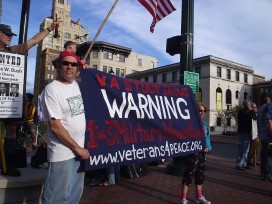
Studies show that one in three women soldiers are raped by male colleagues while in the military. Most rapes go unreported.
For information and action ideas go to the Veterans for Peace website. Truth in Recruiting should include information from the study. Women must be warned not to enlist.
Photo: WRL-Asheville’s Coleman Smith holds banner he crafted for Military Rape Awareness Week. Vance Monument, ASheville, NC
It’s about democracy. It’s about justice. It’s about time.
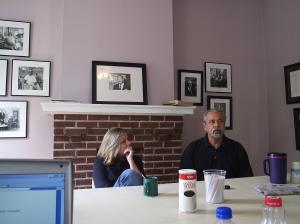 We’re headed to the Historic Penn Center, on St. Helena Island (near Beaufort) S.C. October 3-4 for the annual statewide meeting of the S.C. Progressive Network. In May ‘o9 we had good conversations with Brett Bursey, Becci Robins, John Dawkins, who serves on the board of the SC Pride Movement and Roger Finch in the S.C. Pro Net office in Columbia, S.C. We’re eager to meet and network with other members of this dynamic group that has been holding S.C. accountable on issues of justice and peace for decades. Bret has his roots in the Civil Rights movement and has quite a history of activism. He was instrumental in opening the dialogue on racial issues in S.C. and in 1969, as a student leader at USC, played a major role in the removal of the Confederate flag from the statehouse dome.
We’re headed to the Historic Penn Center, on St. Helena Island (near Beaufort) S.C. October 3-4 for the annual statewide meeting of the S.C. Progressive Network. In May ‘o9 we had good conversations with Brett Bursey, Becci Robins, John Dawkins, who serves on the board of the SC Pride Movement and Roger Finch in the S.C. Pro Net office in Columbia, S.C. We’re eager to meet and network with other members of this dynamic group that has been holding S.C. accountable on issues of justice and peace for decades. Bret has his roots in the Civil Rights movement and has quite a history of activism. He was instrumental in opening the dialogue on racial issues in S.C. and in 1969, as a student leader at USC, played a major role in the removal of the Confederate flag from the statehouse dome. 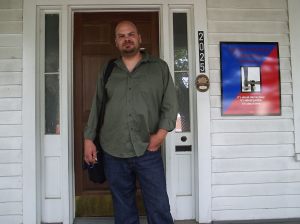
In the South, movement building is about relationships. We know our weekend with our Carolina cousins will be time well spent.
As War Resisters League/Asheville, we’re going as ambassadors from North Carolina bringing with us information from activists and organizations we are meeting as we travel throughout the Southeast.
We are particularly interested in the Nuclearization of the South, the conversion of the Palmetto State to the Plutonium State, and the all too common environmental racism of “Dumping in Dixie.”
North and South Carolina share many things, including the Broad River watershed which houses a cluster of coalfired and nuclear power plants. We’ll be networking with others this weekend looking for creative tactics to resist the use of South Carolina as the nation’s radioactive waste dump now that the proposed Yucca Mountain, Nevada site will not be used.
As we move back out across the Southeast, keep up with our journeys in our next round of posts, and mark your calendars for an important gathering of Southeast Activists Dec.31-Jan 3 and Alternative New Year’s and S.E. War Tax Resistance gathering at the Kings Bay, Georigia, Trident Nuclear Submarine base.
Meeting Up with Veterans for Peace
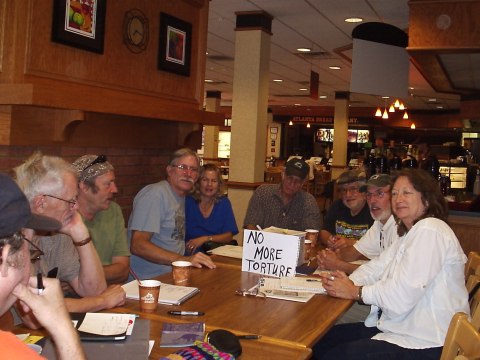
- VFP national Board member Sharon Kufeldt at VFP 99 meeting in Asheville
Our local Veterans for Peace, Chapter 99 is one of the more active groups in Asheville working collaboratively to bring about an end to war.
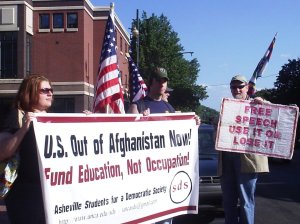
- UNC Asheville SDS joins with VFP at weekly vigil
.
Photos: Clare Hanrahan
Quaker House: On the Front Line in Fayettestan

Coleman at Quaker House Catching up
There was nothing particularly exciting about the approach to Ft. Bragg. The highway goes through commercial strip developments and economically- depressed neighborhoods, with the pawnshops, strip joints and liquor stores typical in most military towns. Telltale US Government Property signs are posted along miles of roadside fence-line. As we passed, we caught glimpses off in the distance of an airfield, drab gray buildings, and armored vehicles painted in desert camouflage. At one pitstop we visited with Tiffany, a clerk at the Family Fare. She said she lived near the post where live ordinance explosions are set off daily. “They rattle our windows and shake the foundations of our homes every day,” she said.
We travelled to Fayetteville to meet with human rights activist and Truth in Recruiting advocate Chuck Fager. He and his partner Wendy Michener, an architect, Quaker, and leader in the Fayetteville Peace with Justice group, offered the hospitality of Quaker House for dinner, conversation and an overnight resting place. Wendy was among seven anti-287(g) protestors charged with disorderly conduct and failure to disperse and found guilty by an Alamance County District Court judge May 15.
Fort Bragg and Fayetteville are “bastions of contrary sentiment,” according to Chuck who has spent most of his adult life working for social and economic justice and peace. He is an author, an historian and a tireless advocate for GI Rights. Kansas born, Chuck was raised in an Air Force family, the oldest of 11 children. He was a non-religious conscientious objector to the Vietnam War, and later worked with Quakers whose peace witness took hold in his life and informed his work, as did his close involvement with the civil rights movement in the South.
In 1965 Chuck was present at the meeting where Dr. Martin Luther King, and others, decided to oppose the Vietnam War—a courageous decision that would fracture the movement and turn many Americans against King and eventually lead to his assassination. While in Selma, Alabama, as a junior member of the SCLC staff, Chuck worked on the voting rights campaign. This led to an overnight in a jail cell he shared with Dr. King.
Chuck was out on some “mission,” when we arrived so as a first assignment in our introduction to Fayetteville he steered us to the Airborne & Special Operations Museum, Dedicated to the glory and memory of all Airborne and Special Operations soldiers from 1940 to the present, and into the future.
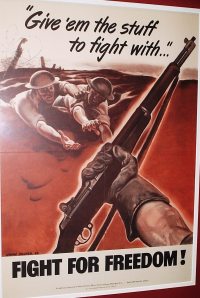
Vintage poster from the museum in Fayetteville
As far as museums go, it was professionally done. Displays were presented along a walking path and time-line continuum. There were full-scale photos, vintage and modern weapons, uniforms, vehicles, tanks, artillery, and a WW II D-Day glider. Life-size paratroopers jumped from a troop carrier suspended from the ceiling. Our senses were assaulted with the constant noise of gunfire, the sound of orders yelled, men screaming, and ordinance exploding. After surviving a series of war zones we discovered a new annex under construction for display of artifacts from wars yet to be fought.
At the gift shop a military wife, with children in tow, mingled with tourists. Maybe they were looking for a model, a patch, a book, a decal—anything to keep alive and fresh the memory of a husband, a parent, or maybe a child away at war. A 4 year-old boy looked quite the willing recruit wearing a plastic helmet and armed with a toy gun.
As we left the museum, Coleman filled out a comment card to get a free souvenir poster. He asked the docent, an older woman, “When did the mission of fighting for freedom and justice for all change to defending corporate profits for the few?” The somewhat startled volunteer replied, “I’m mentally unprepared to answer that question.” But she offered the prize poster anyway, and we headed for the exit, passing a small group of soldiers in maroon berets. They eyeballed us with what seemed to be the same curiosity we had for them.
Quaker House is almost within spitting distance of the museum in a neighborhood of retired and active military families. Through his work and proximity, Chuck has come to understand the kind of pressures these families endure in the military life they have chosen.
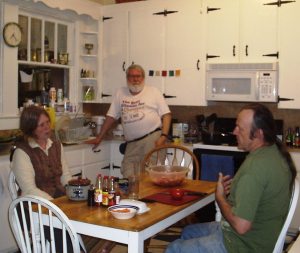
Coleman in the Quaker House kitchen with Chuck & Wendy
In our long, wide-ranging conversations with chuck and Wendy, sitting on the front porch sipping tea, or around the kitchen table preparing and sharing a meal, we realized we were in the company of a man whose lifetime commitment to justice and willingness to serve on the front-line in such a lonely outpost as Fayetteville, can offer rare insights into the history of the peace movement and how to sustain a life of nonviolent action for the long haul.
Fayetteville is not all strip mall and military post, some of the neighborhoods have the charm of many southern towns—sweet smelling magnolias, full grown oak, maple, pecan and poplar trees shading wide avenues and quiet side streets. Beautiful and spacious homes from an older period when families shared them for generations are lined up one after the other. Graced with wide front porches, one can only imagine the conversations and quiet Sunday meetings that were common in these old family homes. Quaker House is situated in such a neighborhood. It has been a peace presence in Fayetteville since 1969, and under Chuck’s leadership since 2002.
It was hot, muggy, and humid when we arrived; and certainly no place for a soldier to have to run around all day with heavy boots and loaded pack training for war. Chuck told us that when he first moved into Quaker House he noticed that the motorcycle parked in front of the neighbor’s house never moved. He later learned that the neighbor’s son had enlisted in the Army and then dropped dead in the heat during a training exercise. One day, Chuck related, he noticed the motorcycle was gone. And soon after he heard that the father had committed suicide. This macabre tale reiterates how the victims of war are all too often not the intended targets.
Fort Bragg, a training center for death and destruction, is home to “a strategic crisis response force, manned and trained to deploy rapidly by air, sea and land anywhere in the world, prepared to fight upon arrival and win.” Ironically, a near neighbor to Fort Bragg is Smithfield Packing Company in Tar Heel –the largest pork processing plant in the world. Three million pigs a year are killed, gutted, prepped, and shipped. On July 1, after a fifteen year campaign, the nearly 5,000 employees at the Smithfield plant ratified the contract agreed to by their union, United Food and Commercial Workers International.
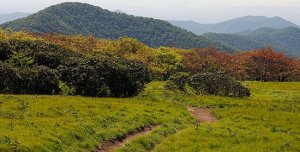
Craggy Mountain balds
Back in Asheville, as we resumed writing our travel blog, we hiked up to Craggy Mountain bald just off the Blue Ridge Parkway for a change of scene. The trail led to a hundred- year old, hand-hewn wooden pavilion where we wrote between conversations with other hikers passing through. The most memorable was eight-year old Catherine. She was hiking with her little sister, older brother, and their mom. Their father was in Iraq driving armored vehicles.
“He had 17 years in the National Guard,” Catherine’s mom told us. “The only way he could get his full pension was to re-up for three more years and deploy to Iraq.” When we mentioned we were writing about our visit to Fayetteville and the Airborne Museum, she said the family had visited the museum while the father trained at Fort Bragg before his deployment.
“What did you think?” Coleman asked.
“I’m not much for the army. I’m not much for the whole thing,” she answered. “But with our family medical history, we couldn’t risk losing the benefits. It wasn’t so much a decision to support the war, but we need the money, and the military is job security.” While she tried to keep an optimistic tone, her eyes and body language revealed her doubt and insecurity. As the family set back down the mountain trail, little Catherine gave voice to the family’s burden. She turned back to say, “I have dreams about my daddy—bad dreams.” We wished we could have reassured her that her daddy would return safely, but we knew that even if he returned in body, he might no longer be the daddy that she remembers. This chance encounter with Catherine’s family provided yet another example of the unintended victims of war.
Inside Quaker House, one wall is dedicated to more tragic victims—the military women, wives and girlfriends killed by returning soldiers just back from the war. This domestic violence, which can be linked to post-traumatic stress is a growing problem within families of returning soldiers. Violence between soldiers on and off the bases is also on the rise, and its causes include PTSD , extended and back to back deployments, and possible rage reactions to required inoculations. It takes special calling to live so proximate to the pain of the war that continues to do violence off the battlefield.
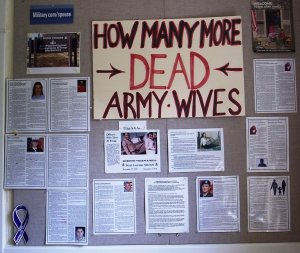
Bulletin Board at Quaker House
In a recent newspaper interview about his work, Chuck said, “There’s a real and increasing gap between the military in America and the rest of America…I’ve watched it deepen over the years, and it’s a very dangerous tendency.”
Over the years, Quaker House has been a focal point for local anti-war organizing, always with a strong emphasis on supporting the troops. Chuck has been “in the orbit” of War Resisters League since 1970, and an early staff member of the WRL magazine WIN in its earlier incarnation. He encourages peace activists who are accustomed to taking stands in “safe haven, liberal strongholds” to travel to Fayetteville and experience firsthand the challenges of organizing in a military and militarized town.As we continue our search for tactics and strategies for organizing in the Southeast we count on input from the Chuck Fagers we’ve met.
In our next post we’ll review some of the ideas that we’ve collected so far and begin to frame them into ways to organize possible training events and regional gatherings.
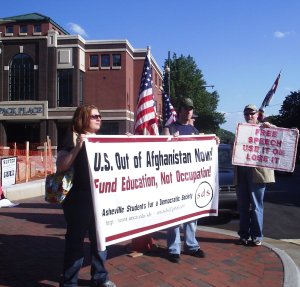
SDS students join with Veterans for Peace in Asheville
Since WRL Asheville began our travels, reconnecting with local members and identifying allies throughout the Southeast, we’ve heard a lot of stories and learned a lot of history. We’ve talked with those who have known and worked alongside Gandhi, King, Thomas Merton and Ceasar Chavez. Others have stood with Myles Horton, Dorothy Day, & Rosa Parks, or ignited the movement with music, like the legendary duo Guy and Candie Carawan.
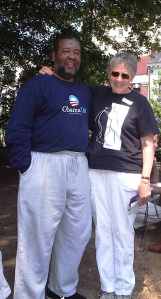
Long-time civil rights activist Issac Coleman and WRL member Sue Walton
Sometimes we sit around a fire circle, or cross paths at the library, a coffee shop, or favorite local restaurant. We’ve visited on front porches sipping iced tea, in conference rooms of activist offices, and at kitchen tables helping prepare a meal. We’ve even crouched down along a row of beans helping a farmer harvest for market as we planned for a gathering of war tax resisters. We’ve helped with trainings for nonviolent campaigns as varied as confronting banks that finance mountain top removal, to developers stealing the public commons in our town.
With Asheville being the activist crossroads that it is, we keep our ear to the ground and participate and collaborate in actions planned by many local groups, including UNC Asheville SDS, Veterans for Peace, Women in Black, the Buncombe Greens, Katuah Earth First! Coalición de Organizaciones Latino-Americanas (COLA), Canary Coalition, and more. The rich mixture of people we meet right here at home—some activists, some not— opens a window on local and world issues providing a perspective that highlights the need for our work.
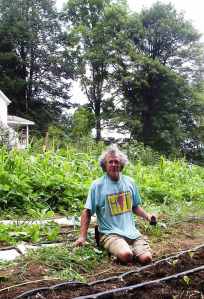
Out in the field with organic farmer and war tax resister Jim Stockwell in Celo
In our travels we’ve been welcomed into homes of both rural and urban activists, many with decades of dedicated work for social and economic justice. We’ve met people living in well-supported action communities, and those who take a stand in lonely outposts where political allies are hard to find. Some have just set out on their paths of action; others have generated the campaigns and movements that still have relevance today.
In our next post we will highlight our recent visit to Fayetteville, North Carolina, home of Fort Bragg, with the mission “to maintain the XVIII Airborne Corps as a strategic crisis response force, manned and trained to deploy rapidly by air, sea and land anywhere in the world, prepared to fight upon arrival and win.”
In the midst of this miliatry town, we met with long-time activist Chuck Fager and learned more about Quaker House, a peace witness there since 1969, and the work of the GI Rights hotline: 877-447-4487
Asheville Calls for Health Care Revolution
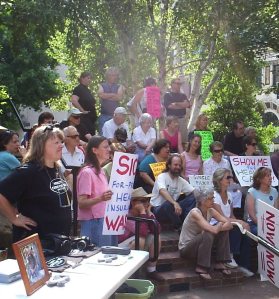
Leslie Boyd (L) and WRL Asheville member Cicada Brokaw (C) at Health Care Rally
Asheville residents packed Pritchard Park Saturday to call for a revolution in health care. The public rally was organized by WNC for Change, a group whose director, Paul Choi, and other members call themselves “Obama Alumni.” It was a spirited late morning gathering with folks from diverse groups united in a strong call for health care for all. UNCA SDS students and Asheville WRL members were present, as well as Progressive Democrats, Buncombe Greens, Veterans for Peace, and local candidates for city council. The Mayor spoke and the chair of the Buncombe County Commission, as well as Dr. Errington Thompson, a trauma surgeon and local progressive radio talk show host. Also speaking was Dick Walton, M.D. he and his wife Sue are long-time WRL members who have been working for justice in these parts for decades. 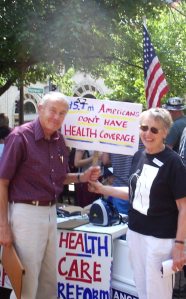
Dick & Sue Walton at Health Care Rally
Hope as Smooth as Silk
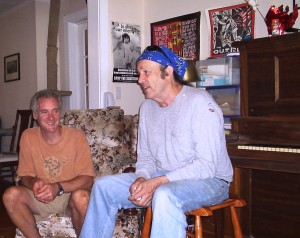
Steve Woolford & Coleman Smith at Silk Hope
Practicing the spirituality of the
“Lilies of the field”
Silk Hope Catholic Worker House, is a permaculture oasis in Chatham County, North Carolina, and a point of light for soldiers seeking counseling about GI Rights and conscientious objection to participating in war.
Catholic Workers Steve Woolford and Lenore Yager are deeply involved in the everyday work of parenting, maintaining a rural homestead, and practicing the skills of simple and sustainable living, all the while keeping open the door of hospitality for folks in need of safe harbor, and being the knowledgably reassuring voices at the other end of the GI Rights Hotline. They offer the service in collaboration with Quaker House , about 60 miles away in Fayetteville, site of Fort Bragg, the home base of U.S. Army Paratroopers and Special Operations Forces.
We set out for Silk Hope with good directions and a picnic lunch provided by activists John Heuer and Peggy Misch in Carrboro on a fine Spring morning. We passed through rolling and forested piedmont, along two-lane country roads, and down straight stretches of highway marking old farmland boundaries. Along the way, we noticed that an increasing number of housing developments have encroached upon the rural beauty, interrupting the deep and restful greens of forest and farm.
Within the rural acre of Silk Hope Catholic Worker farm, on Woody Store Road near Siler City, the vegetable and herb gardens filled the grounds in front of the early 1900s wooden farmhouse where Steve and Lenore live with their beautiful and spirited children, big sister Genevieve and little brother Quinn. The children greeted us from the front porch while Susan, a GI Rights Hotline worker visiting from San Francisco, showed us into the house. Susan was visiting Silk Hope prior to participating in a gathering of GI Rights Hotline volunteers and organizations meeting in Atlanta the following weekend.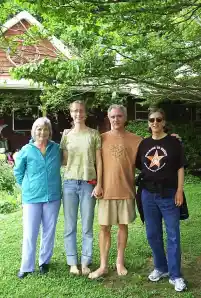
As we talked about our interest in facilitating a gathering of trainers, activists and organizers in the S.E., Steve and Lenore, told us of their involvement with the Southern Life Community, a gathering of regional, faith-based activists. The SLC, Clare told them, seems to be a revival of similar gatherings of the same name she attended in Florida and Georgia over a decade ago. Good to know that such vital community building is ongoing.
After a generous two and a half hour visit out of their very busy day, we toured the gardens. Steve talked of the difficulties in running a farm when many of the volunteers who come are more interested in the peace and justice work than in getting the onions in or the weeds out. Despite the lack of dedicated farmhands, the corn was knee high, the comfrey in bloom and the tendrils of sweet peas winding up the fence.
On our return to Asheville, we were able to refer a query we received about conscientious objection from a young N.C. National Guard recruit to Steve and Lenore. The soldier had just returned from basic and advanced training and was now questioning the wisdom of his decision to enlist. He had been searching the Internet for links to conscientious objection and CO counseling and ended up at the WRL Asheville site. In addition to referring him to Steve and Lenore, we also steered him to the AFSC offices in Greensboro, to Chuck Fager at the Quaker House in Fayetteville, and our old friend from his Asheville days, Jason Hurd now in Savannah organizing S.E. Iraq Veterans Against the War. We met with Jason, later in our travels.
Along the road to our next stop in Fayetteville, the landscape transitioned from piedmont to sand hills to the tidewater, with the heat and humidity rising. We stopped for a break at the J&L Leather Shop, a motorcycle apparel and supply store just outside Fayetteville. In conversations with Laura, the shop owner, she revealed how the locals were complaining about agricultural pesticide runoff and how those chemicals were the likely culprits that killed one of her dogs and made the other deathly ill. When the conversation turned to smoking, vegetarianism, and ecological health Coleman soon found common ground with Laura by talking about how the design and care of the human body is not so unlike the care required for a finely tuned road bike; that striving to eliminate poisons from our food, land, and water is a worthwhile endeavor.
After such good conversation with this southern, Christian (Laura’s card is embossed with the sign of the Fish) motorcycle mama, we marveled at yet another unexpected challenge to preconceived notions of regional inhabitants. By taking time for conversation, we can often discover just how much we may have in common. As we left the shop, though, we were taken aback by the concrete yard sculpture of a brown and barefoot Hispanic man, with moustache and sombrero, all-too reminiscent of the Black lawn jockey ornaments and other stereotyped images once so prevalent in our region. Is this new lawn ornament a tellling indication of the anti immigrant racist focus building in the South? 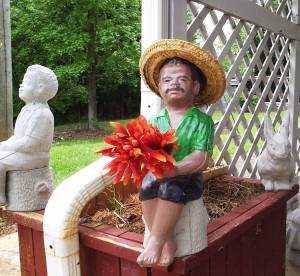
Next post: Plunge with us into the belly of the beast at Fort Bragg. First stop the Airborne & Special Operations Museum
Dedicated to the glory and memory of all Airborne and Special Operations soldiers from 1940 to the present, and into the future.
Hello Fayette-stan!
Direct Action Advocate Speaking in Asheville

Fr. Louie Vitale
UPCOMING EVENTS: SUNDAY, JUNE 21, 2009, 6 to 8 p.m.
Let’s welcome Fransiscan Friar Louis Vitale to Asheville.
Loving Your Enemies: Transforming Us vs Them Thinking
Location: Asheville Buncombe Tech Community College
Simpson Administrative Building
 Leave a Comment
Leave a Comment